
On January 29–31, 2020, the National Mentoring Summit brought together youth mentoring organizations along with government, civic, research, and corporate leaders to evaluate best practices, review new research, and chart the future of the mentoring field. The summit is held every January as part of National Mentoring Month.
Organized by MENTOR: The National Mentoring Partnership, the event featured more than 90 workshops that showcased exemplary program models, collaborations, research, and innovations that have positive implications for strengthening the mentoring field. The event included six tracks that highlighted specific areas of interest—advocacy, philanthropic partnerships, culturally specific practices, research, supporting the mentoring match, and nonprofit management.
Katharine T. Sullivan, Principal Deputy Assistant Attorney General for the Office of Justice Programs, offered remarks on January 30. “I am, and have always been, a huge believer in the power of mentoring,” she said. “What better way to ensure that young people are taking the right path than to connect them to people who have successfully navigated that same path? When done right, it’s as good a prevention tool as any I know of, which is why OJP [the Office of Justice Programs] has supported mentoring programs for more than two decades.” —President Donald J. Trump,
Presidential Message on National Mentoring Month
Before the summit, OJJDP offered a training session for its new mentoring grantees on federal requirements and best-practice standards. Topics covered in the session included technical assistance available through OJJDP's National Mentoring Resource Center, the special conditions in OJJDP grant awards related to mentor screening and background checks, strategies for tracking program implementation and quality, and assessing program outcomes.
—Christina Sanchez, Program Manager, The Governor's Prevention Partnership [Connecticut]
—Veronica Stancliff, Support Specialist, Big Brothers Big Sisters Eastern Shore
—Jackie Young, Child Welfare Specialist, Community Youth Network
In fiscal year 2019, through its Mentoring Opportunities for Youth initiative, OJJDP awarded more than $81 million in grants to 33 organizations across 21 states to support mentoring programs for youth. The Office also awarded $2 million to continue the operations of the National Mentoring Resource Center. Last year alone, the center provided training and other support to 362 school-, community-, and faith-based mentoring programs that served more than 79,000 youth nationwide, thanks to funding from OJJDP.
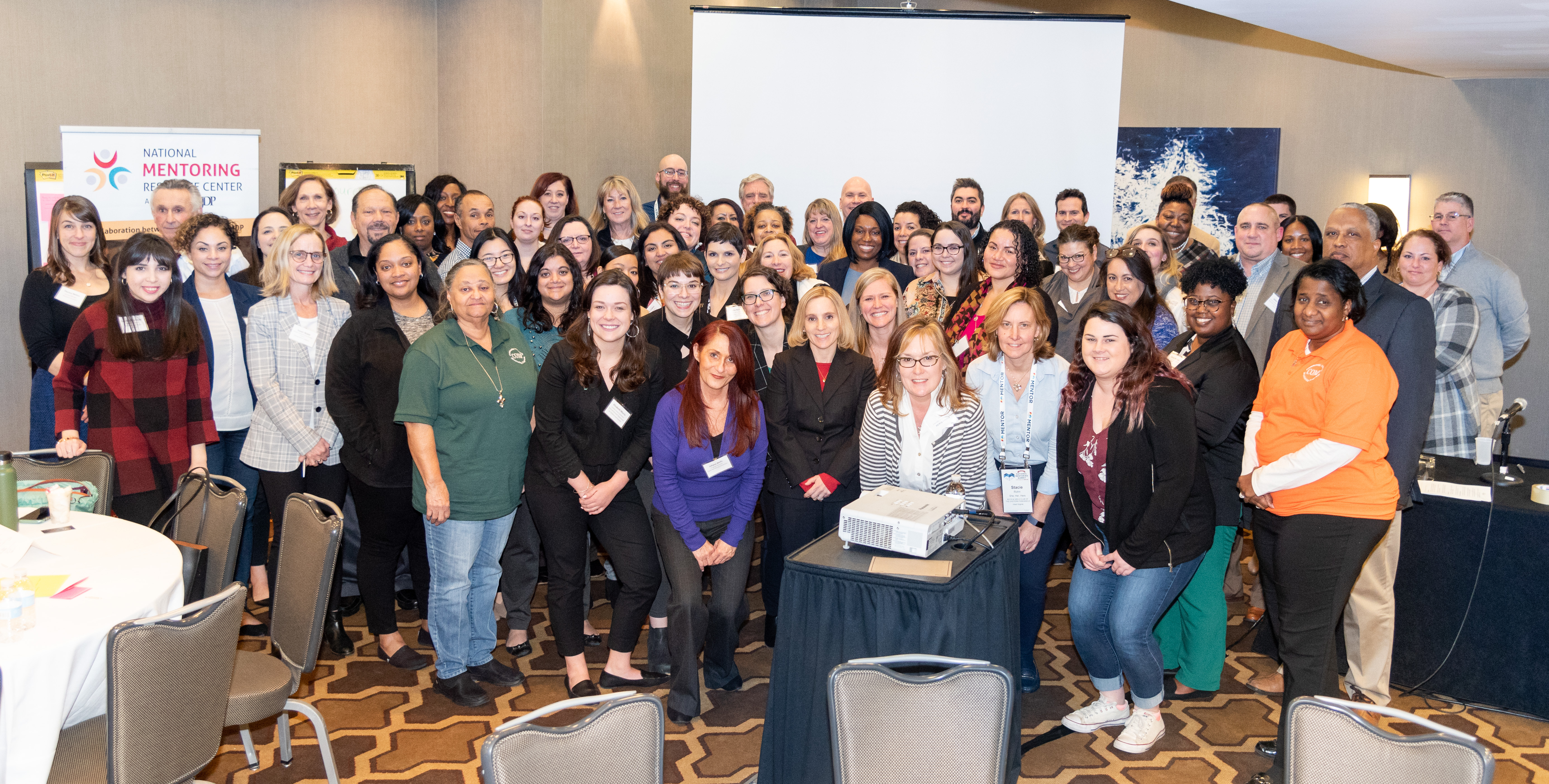 On January 28, OJJDP offered a comprehensive training session for its new mentoring grantees on federal requirements, best practices, and training and technical assistance resources. More than 60 representatives of mentoring organizations registered for the training. Pictured are OJJDP staff and the session participants.
On January 28, OJJDP offered a comprehensive training session for its new mentoring grantees on federal requirements, best practices, and training and technical assistance resources. More than 60 representatives of mentoring organizations registered for the training. Pictured are OJJDP staff and the session participants.Resources:
To learn more about OJJDP’s mentoring programs and services, visit the Office’s website. For more information about what works in mentoring as well as training and technical assistance available through OJJDP’s National Mentoring Resource Center, read “Stakeholder’s Corner: Improving the Quality and Effectiveness of Mentoring” in this issue.
OJJDP’s Model Programs Guide contains information about evidence-based juvenile justice and youth prevention, intervention, and positive youth development programs. The guide offers information about 48 mentoring programs as well as a review of the research literature on mentoring. For more information about mentoring-related research, programmatic grants, training and technical assistance, and publications, visit the OJJDP website.
The National Criminal Justice Reference Service has released a special feature on mentoring, which provides access to federal and federally funded publications and online resources related to mentoring youth.
The commercial sexual exploitation of children encompasses a range of crimes and activities involving sexual abuse or exploitation for financial benefit or in exchange for anything of value. Despite current efforts, the threat of child sexual exploitation remains very real; it can occur in the home, on the street, over the Internet, in the United States, or overseas.
OJJDP is dedicated to combating commercial sexual exploitation and addressing the unique needs of young victims. Fiscal year (FY) 2019 grants of approximately $4 million awarded under the Specialized Services and Mentoring for Child and Youth Victims of Sex Trafficking and Sexual Exploitation program are helping organizations develop or enhance their mentoring capacity, facilitate outreach efforts, and increase the availability of direct services for this vulnerable population.
—President Donald J. Trump,
Proclamation on National Slavery and Human Trafficking Prevention Month, 2020
An additional $2.5 million awarded under the Strengthening Investigative Tools and Technology for Combating Child Sexual Exploitation program is facilitating the development, refinement, and advancement of investigative tools, methods, and technologies that address child pornography, exploitation, and sex trafficking.
In FY 2019, OJJDP awarded $3.5 million to the National Center for Missing & Exploited Children via an interagency agreement with the Office for Victims of Crime to assist with (1) the review of CyberTipline reports related to child sex trafficking, (2) the response to information regarding the location of missing children at high risk of or involved in trafficking, and (3) training and technical assistance on trauma-informed responses to victims.

OJJDP supports the National Council of Juvenile and Family Court Judges’ National Judicial Institute on Domestic Child Sex Trafficking. Held several times a year, the institute helps judicial officers better understand the applicable laws and legal considerations involving trafficking victims, how to identify trafficked and at-risk children, and how to connect these youth to appropriate services. In FY 2019, the OJJDP-sponsored National Criminal Justice Training Center offered a 3-day training to help law enforcement officials understand, recognize, and investigate cases involving child sex trafficking and exploitation.
Youth Collaboratory, with funding from OJJDP and in partnership with the Center for Combating Human Trafficking at Wichita State University, provides training and technical assistance to organizations that are working with young victims of commercial sexual exploitation and domestic sex trafficking. With support from OJJDP, Youth Collaboratory has developed a toolkit for youth service providers that provides information about emerging research and best practices along with implications for practice at the individual, program, and community levels.
In 2019, OJJDP released findings of a three-phase study that assessed the impact of safe harbor laws on the commercial sexual exploitation of children. Safe harbor laws are designed to protect young victims from punitive sanctions and refer them instead to supportive services.
Resources:
Read President Trump’s executive order creating a position within the Domestic Policy Council to work on issues related to combating human trafficking. The order was signed during a January 31, 2020, White House summit on the issue.
To learn more about OJJDP programs that address the commercial sexual exploitation of children, visit the Office’s website.
OJJDP's online Model Programs Guide provides information about programs to help children exposed to violence and victimization. The guide also includes reviews of research literature on the commercial sexual exploitation and sex trafficking of children. Access a comprehensive list of services for trafficking survivors on the OJJDP website.
Visit the Department of Justice’s Human Trafficking webpage to learn more about legislation, resources, and initiatives aimed to prevent and end trafficking.
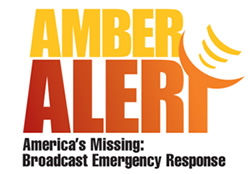 National AMBER Alert Awareness Day is observed every year on January 13 to share information with the public about how to become engaged in the safe recovery of missing and abducted children.
National AMBER Alert Awareness Day is observed every year on January 13 to share information with the public about how to become engaged in the safe recovery of missing and abducted children.
AMBER Alerts are emergency messages issued when a law enforcement agency determines that a child has been abducted and is in imminent danger. OJJDP engages partners, including the National Center for Missing & Exploited Children (NCMEC), federal law enforcement agencies, wireless carriers, Internet service providers, and social media outlets, to support the program.
AMBER Alert plans have been established in all 50 states, the District of Columbia, Puerto Rico, and the U.S. Virgin Islands, and the program has expanded into Indian country and the nation’s northern and southern borders. As of December 31, 2019, a total of 977 children have been successfully recovered through the AMBER Alert system.
OJJDP’s AMBER Alert Training and Technical Assistance Program serves law enforcement first responders, investigators, and supervisory personnel as well as other nonprofit and community child protection professionals and community groups. Training is available in a range of areas, including basic forensic responses to missing and abducted children, investigative strategies for child abduction cases, child abduction case studies, the implementation of Child Abduction Response Teams, and child sex trafficking in Indian country.
In fiscal year 2019, OJJDP awarded grant funds totaling $4.4 million under the training and technical assistance program. A minimum of $1.5 million of the amount was earmarked to carry out provisions of the Ashlynne Mike AMBER Alert in Indian Country Act of 2018. The law provides for the formal integration of tribal AMBER Alert systems into state AMBER Alert systems and makes tribes eligible for AMBER Alert grants. It also permits the use of grant funds to integrate state or regional AMBER Alert communication plans with an Indian tribe and allows for waivers of the matching funds requirement.
In 2019, OJJDP developed a new AMBER Alert in Indian Country website. In addition to many other features, the site offers tribal communities information about training and technical assistance and opportunities for collaboration with other AMBER Alert partners throughout the country. The Office of Justice Programs has upgraded its AMBER Alert website with new information to support tribal partners. It also provides publications, statistics, points of contact, and other resources on a variety of topics related to AMBER Alert.
OJJDP convened the inaugural National AMBER Alert in Indian Country Symposium on July 30–August 1, 2019, in New Mexico. The event brought together tribal leaders, state AMBER Alert coordinators, public safety officials, and federal representatives to exchange information about implementing AMBER Alert plans in Indian country.
Earlier in 2019, the Office convened a 3-day National AMBER Alert Symposium attended by AMBER Alert coordinators, Missing Person Clearinghouse managers, and Child Abduction Response Team members from across the United States, Mexico, and Canada.
Both symposiums allowed participants to share best practices to improve the nation’s response to missing and exploited children and learn about resources available through NCMEC, the AMBER Alert Training and Technical Assistance Program, and other OJJDP partner programs.
Resources:
Implementation of the Ashlynne Mike AMBER Alert in Indian Country Act of 2018: A Report to Congress discusses the readiness; education, training, and technological needs; and obstacles tribes encounter in the integration of AMBER Alert plans.
AMBER Alert Best Practices provides law enforcement and other first responders with online, comprehensive, best-practice recommendations on field operations, including the mapping of key decision points in the life cycle of an AMBER Alert.
AMBER Alert Field Guide for Law Enforcement Officers discusses suggested practices in key areas such as the initial on-scene response and investigation, the establishment of tip call centers and management of tip information, the use of Child Abduction Response Teams, and search and recovery operations.

OJJDP Associate Administrator Kellie Blue.
Ms. Blue and her staff oversee programs that support juvenile drug courts and family drug courts. These courts use a treatment-oriented approach that addresses the substance abuse and co-occurring mental health disorders that often are present in youth and families who come into contact with the juvenile justice system.
The Intervention Division also manages programs focused on juvenile justice system improvements that enhance public safety, reduce reoffending, and improve youth outcomes while holding youth appropriately accountable. Targeted improvements include decreasing preadjudicatory detention and out-of-home placements and strengthening diversion and community-based alternatives. In addition, funding and other resources are provided to support juvenile indigent defense.
The Intervention Division is helping to ensure the delivery of comprehensive reentry services to youth while they are still confined and during their reentry into the community. “We promote the use of a comprehensive risk and needs assessment, which takes into account the strengths and needs of youth as well as the risk for reoffending once back in the community,” said Ms. Blue. “We also support permanency planning and assistance to youth in overcoming the collateral consequences often associated with juvenile justice system involvement.”
![]() The opioid epidemic is posing a significant threat to youth and community safety, and OJJDP is working with states and communities participating in our Opioid Affected Youth Initiative to identify, respond to, treat, and support children, youth, and families impacted by the epidemic.
The opioid epidemic is posing a significant threat to youth and community safety, and OJJDP is working with states and communities participating in our Opioid Affected Youth Initiative to identify, respond to, treat, and support children, youth, and families impacted by the epidemic.![]()
—Kellie Blue, Associate Administrator
Ms. Blue’s division oversees the Tribal Youth Program, which includes prevention services, interventions for court-involved tribal youth, improvements to the tribal juvenile justice system, and substance abuse prevention and mental health services. The division supports the work of juvenile healing to wellness courts for court-involved youth who are struggling with substance abuse. While holding youth accountable for delinquent behavior, the courts work as a team with tribal healing resources to offer structured and phased treatment and rehabilitation services.
During her 22-year tenure at OJJDP, Ms. Blue has also served as deputy administrator and acting associate administrator in the Office’s Demonstration Programs Division and as associate administrator in the Juvenile Justice Systems Improvement Division. In addition, she provided overall coordination for the Safe Schools/Healthy Students Initiative, a collaborative effort of the Departments of Education, Health and Human Services, and Justice that provided funding to more than 200 schools and communities across the nation to promote healthy childhood development and prevent violence.
Before joining OJJDP, Ms. Blue served as deputy director at the Justice Research and Statistics Association, where she managed and administered various evaluation and research projects funded by the Bureau of Justice Assistance and the National Institute of Justice. She earned a bachelor’s degree in political science from Susquehanna University and a master’s degree in administration of criminal justice from the American University.
By Melissa English, Project Manager, National Mentoring Resource Center
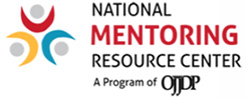
Since it was established in 2015, the OJJDP National Mentoring Resource Center (NMRC) has emerged as a leading provider of technical assistance and best-practice information for mentoring programs across the country.
Our no-cost technical assistance provides a broad range of services, including enhancing recruitment practices, establishing quality protocols for screening potential mentors, and developing mentor trainings. Our consultations with mentoring organizations are provided through phone calls, resource referrals, virtual meetings and communications, and, when possible, in-person trainings. In fiscal year (FY) 2019 alone, we delivered more than 10,000 hours of technical assistance to mentoring organizations nationwide.
Our website provides a wealth of mentoring resources, including rigorous reviews by the center’s Research Board regarding evidence on the effectiveness of programs and practices. The Research Board is composed of more than 30 prominent researchers with expertise in areas encompassing diverse program models, settings for implementation, populations, and outcomes of interest.
In addition, the website offers access to archived webinars and podcasts, e-learning modules, and a range of practice tools that include NMRC’s Measurement Guidance Toolkit, which helps mentoring programs measure youth outcomes and program effectiveness. Another suite of tools is designed to strengthen support for mentoring relationships and ensure a positive closure to the mentor-mentee relationship. During FY 2019, more than 153,600 mentoring professionals used the NMRC website.
Through training and technical assistance, comprehensive online resources, and the active engagement of NMRC researchers in everything we do, NMRC is improving the quality and effectiveness of youth mentoring nationwide. We are grateful for OJJDP’s ongoing support of this vital work.
Resources:
To receive updates on NMRC offerings and activities, sign up for the monthly e-newsletter.
Learn more about OJJDP’s mentoring programs.
_______________
Points of view or opinions expressed in this article are those of the author and do not necessarily represent the official position or policies of the U.S. Department of Justice.
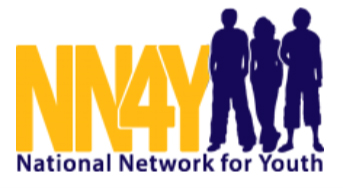 National Summit on Youth Homelessness: March 2–3, 2020
National Summit on Youth Homelessness: March 2–3, 2020
The National Network for Youth will hold its seventh annual summit in Washington, DC. This event focuses on how government agencies, policymakers, young leaders, service providers, and other experts can collaborate to prevent and respond to youth homelessness. Sessions will include discussions of practices, resources, and strategies that are relevant to participants’ work in addressing youth homelessness. Registration information is available online.
Multidisciplinary Team Response to Child Sex Trafficking: March 9–12, 2020
This no-cost training, offered by the National Criminal Justice Training Center, will improve multidisciplinary team (MDT) responses to child sex trafficking cases and assist those wanting to establish a formal MDT in their community to effectively respond to child sex trafficking. Subject matter experts will work with teams to identify gaps and develop short- and long-term response plans. The training will be held in Providence, RI. Registration information is available online.
This training will also take place May 4–7 in Columbus, OH, August 31–September 3 in Memphis, TN, and November 16–19 in Denver, CO.
Child Homicide Investigations: March 16–17, 2020
The National Criminal Justice Training Center will hold this training in Blanco, TX. It will focus on understanding and building relationships between forensic pathologists, homicide investigators, and prosecutors to successfully investigate and prosecute child homicide cases. The training is designed for prosecutors as well as court system, law enforcement, social work, and victim service professionals. Registration information is available online.
The training will also be held May 18–19 in Aurora, CO, and June 1–2 in Ponderay, ID.
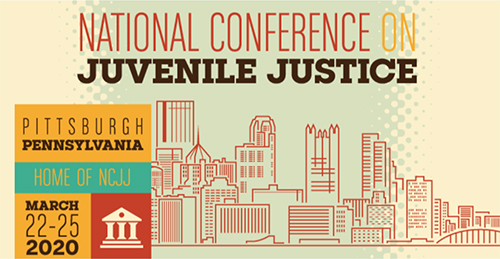 National Conference on Juvenile Justice: March 22–25, 2020
National Conference on Juvenile Justice: March 22–25, 2020
This conference, sponsored by the National Council of Juvenile and Family Court Judges, will offer an educational opportunity for judges, probation officers, detention facility employees, and other stakeholders in the juvenile justice system. The conference will explore gaps in services, new and improved practices, and cutting-edge research. Topics to be covered include alternatives to detention, trauma-informed justice, crossover youth, the domestic sex trafficking of minors, racial and ethnic disparities, school pathways to the justice system, child development, and juvenile and family treatment drug courts. OJJDP Administrator Caren Harp, Deputy Administrator Chyrl Jones, Senior Policy Advisor Cynthia Pappas, and other OJJDP staff will be presenting at the conference. The event will be held in Pittsburgh, PA. Registration information is available online.
36th International Symposium on Child Abuse: March 23–26, 2020
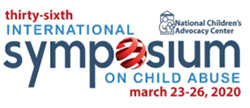 Hosted by the National Children’s Advocacy Center, this symposium will provide expert training and numerous networking opportunities to professionals in the child maltreatment field. The event will offer tracks on a range of topics, including child protective services, forensic interviewing, human trafficking/sexual exploitation, law enforcement, victim advocacy, and prevention. The symposium will be held in Huntsville, AL. Registration information is available online.
Hosted by the National Children’s Advocacy Center, this symposium will provide expert training and numerous networking opportunities to professionals in the child maltreatment field. The event will offer tracks on a range of topics, including child protective services, forensic interviewing, human trafficking/sexual exploitation, law enforcement, victim advocacy, and prevention. The symposium will be held in Huntsville, AL. Registration information is available online.
Forensic Interviewing of Children: April 20–24, 2020
Presented by the National Children’s Advocacy Center (NCAC), this training is intended for professionals with less than 2 years of experience conducting forensic interviews of children, experienced child abuse professionals seeking to sharpen existing skills, and professionals who want to learn about the current NCAC Child Forensic Interview Structure. The course will be held in Huntsville, AL. Registration information is available online.
The training will also be offered in Huntsville on June 22–26.
Child Abduction Response Team Training: April 21–23, 2020
The National Criminal Justice Training Center will offer this training in Great Falls, MT. The training will discuss how to develop an effective multidisciplinary Child Abduction Response Team (CART) for responding to endangered, missing, or abducted children. Participants will learn about the impact a child abduction has on the family, incident command considerations, search and canvassing operations, CART activation, and resources to improve the response, investigation, search, and canvass activities associated with missing children investigations. Registration information is available online.
 Advanced Forensic Interviewing: April 22–24, 2020
Advanced Forensic Interviewing: April 22–24, 2020
Offered by the National Children’s Advocacy Center, this training is designed for experienced child forensic interviewers who would like to build on their interviewing skills. The training reviews best practices and then addresses specific populations that place demands on forensic interviewers to adapt their practice, exploring methods to elicit details required by the multidisciplinary team and assessing the effects of trauma on children. Completion of a recognized forensic interviewing basic training and current forensic interview experience is required. The training will be held in Fort Lauderdale, FL. Registration information is available online.
The training will also be held October 13–15 in Portland, OR.
Conducting Child Abuse Investigations: April 27–May 1, 2020
To be held in San Diego, CA, this no-cost training will offer the latest information on the investigation and prosecution of child abuse cases using a multidisciplinary team approach. Attendees will learn about medical evidence, techniques for interviewing child victims/witnesses as well as adult suspects/witnesses, and legal issues and considerations in child physical and sexual abuse cases. The training is offered by the National Criminal Justice Training Center. Registration information is available online.
The training will also be offered July 27–31 in Saint Louis, MO.
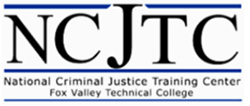 Sexual Offenses: Mind and Motivation: May 4–5, 2020
Sexual Offenses: Mind and Motivation: May 4–5, 2020
This training, to be held in Chandler, AZ, will offer an introduction into the mindset of those who commit sexually motivated crimes. Attendees will learn about sex offender typologies and patterns of behavior. The training will explore the relationship between paraphilia (e.g., exhibitionism, voyeurism, and fetishism) and criminal acts. Participants will discuss actual case examples to gain insight into offenders’ methods. The training is offered by the National Criminal Justice Training Center. Registration information is available online.
The training will also be held August 3–4 in Appleton, WI, and September 16–17 in Mansfield, MA.
Conducting Unexplained Child Death Investigations: May 11–14, 2020
To be held in Birmingham, AL, this no-cost training will discuss statistics, causes, and risk factors in cases involving child deaths. The training, presented by the National Criminal Justice Training Center, will also focus on legal issues and considerations, child development, the medical response to pediatric emergencies, investigator roles and responsibilities in cooperation with the medical examiner, the initial response to a child death and protection of the death scene to avoid contamination of evidence, and digital evidence. Registration information is available online.
The training will also be held August 24–27 in Phoenix, AZ.
 All Rise 20 Conference: May 27–30, 2020
All Rise 20 Conference: May 27–30, 2020
The National Association of Drug Court Professionals annually hosts a conference on addiction, mental health, and justice reform. The conference brings together leaders from all models of treatment courts, the recovery community, law enforcement, veteran service organizations, legislators, and other key stakeholders to learn the latest evidence-based practices for serving individuals with substance use and mental health disorders. The conference offers continuing legal education, continuing judicial education, and continuing education units for most states. Registration information is available online.
OJJDP Leadership Participates in Training for Directors of Juvenile Correctional Facilities
 On January 11–14, 2020, the Council of Juvenile Justice Administrators offered an OJJDP-funded training in San Diego, CA, for administrators of state and local secure juvenile justice facilities. OJJDP Administrator Caren Harp offered introductory remarks on the training’s second day. Later that day, Administrator Harp and Associate Administrator TeNeane Bradford led a session on the Juvenile Justice Reform Act of 2018 and OJJDP’s Title II Formula Grants program.
On January 11–14, 2020, the Council of Juvenile Justice Administrators offered an OJJDP-funded training in San Diego, CA, for administrators of state and local secure juvenile justice facilities. OJJDP Administrator Caren Harp offered introductory remarks on the training’s second day. Later that day, Administrator Harp and Associate Administrator TeNeane Bradford led a session on the Juvenile Justice Reform Act of 2018 and OJJDP’s Title II Formula Grants program.
The training included presentations and workshops on a range of other topics, including youth’s readiness for reentry, correctional education, human trafficking, strategies to maintain safety and security, the multigenerational workforce, staff wellness, the engagement and empowerment of families, the reduction of racial and ethnic disparities, and positive youth development. As part of a 6-month followup process, which will include a webinar series and monthly conference calls, participants will develop an action plan to address an emerging issue or challenge facing their facility.
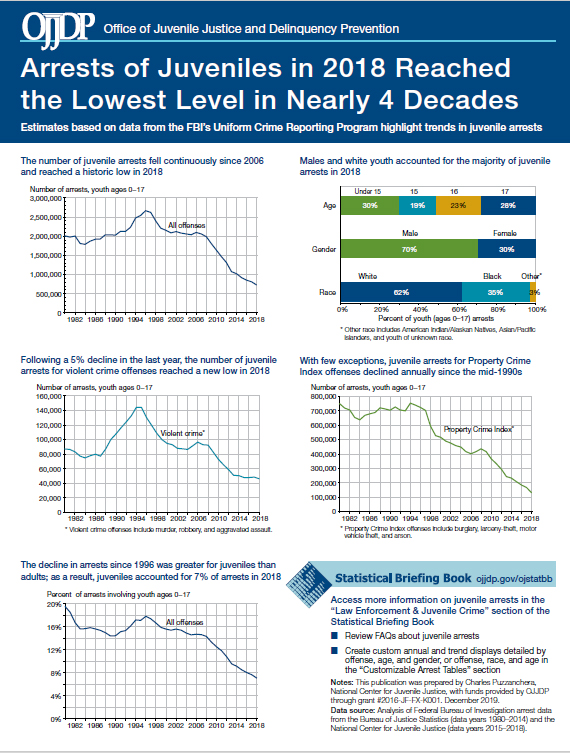 Data Snapshot Shows Juvenile Arrests at Lowest Level in Four Decades
Data Snapshot Shows Juvenile Arrests at Lowest Level in Four Decades
The OJJDP Statistical Briefing Book has added a Data Snapshot that provides a look at trends in juvenile arrests. The Snapshot draws on data from the FBI’s Uniform Crime Reporting Program.
The number of juvenile arrests fell continuously since 2006 and reached an historic low in 2018. The decline in arrests since 1996 was greater for juveniles than adults; as a result, juveniles accounted for 7 percent of arrests in 2018.
Males and white youth accounted for the majority of juvenile arrests in 2018. Following a 5-percent decline in the past year, the number of juvenile arrests for violent crime offenses reached a new low in 2018. With few exceptions, juvenile arrests for Property Crime Index offenses declined annually since the mid-1990s.
Access the full list of Data Snapshots on the Statistical Briefing Book site.
OJJDP Statistical Briefing Book Updated
Developed for OJJDP by the National Center for Juvenile Justice, the Statistical Briefing Book (SBB) provides answers to the most commoly asked questions about juvenile offending, victimization of juveniles, and involvement of youth in the juvenile justice system. In addition, the data analysis and dissemination tools available through SBB give users quick and easy access to detailed data on a variety of juvenile justice topics. Following are recent updates:
 New Frequently Asked Questions (FAQs) based on the Monitoring the Future survey to document substance use reported by high school students have been added to the Self-Report Behaviors section under Offending by Juveniles.
New Frequently Asked Questions (FAQs) based on the Monitoring the Future survey to document substance use reported by high school students have been added to the Self-Report Behaviors section under Offending by Juveniles.- FAQs about school crime victimization have been updated to include data through 2017.
- FAQs describing the age boundaries of juvenile court jurisdiction by state have been updated through 2018.
- FAQs describing juveniles tried as adults have been updated through 2018.
Restorative Justice Working Group Meets With OJJDP Leadership
On January 6–7, 2020, members of OJJDP’s Restorative Justice Working Group met with Administrator Caren Harp and OJJDP staff in Washington, DC, to move forward on developing OJJDP guidance materials that will help jurisdictions implement effective restorative justice programs for victims, juvenile offenders, and communities.
Restorative justice focuses on balancing the interests and needs of victims/survivors, offenders, and communities. It also holds offenders individually accountable not only to their victims, but also to the community at large—often through face-to-face meetings and reparative actions such as financial restitution to victims, the repair of victims’ damaged property, or work for the betterment of the community.
During its 1.5-day meeting, the group discussed a range of items and topics to be included in the guidance materials, including a glossary of terms and acronyms, reviews of the research literature and pertinent legislation, guiding principles of restorative justice, core practices, strategic goals, implementation, and performance measures.
Video Recordings From OJJDP’s National Training Conference Now Available Online
OJJDP’s National Training Conference, held on September 24–26, 2019, in Kansas City, MO, offered a wealth of information and resources to help states and territories prevent delinquency and improve the juvenile justice system. Approximately 200 participants engaged in interactive discussions, panels, and workshops to enhance implementation of OJJDP’s Title II Formula Grants program and support compliance with the core requirements of the Juvenile Justice and Delinquency Prevention Act. The conference was organized by the Office’s State Relations and Assistance Division.
Video recordings of four conference sessions are now available on the OJJDP website: Administrator Caren Harp’s welcoming remarks and update on the Juvenile Justice Reform Act of 2018 (JJRA), a discussion of the JJRA’s new requirements regarding youth waived to adult court, a walk-through of the updated features and content of the Office’s online Compliance Monitoring Tool, and a presentation on OJJDP’s redesigned website. Also accessible online is a video recording of interviews with youth members of state advisory groups.
Additional recordings of conference sessions and interviews with participants will be added to the OJJDP website as they become available.

Internet Crimes Against Children Task Forces Promote Safer Internet Day
OJJDP’s Internet Crimes Against Children (ICAC) Task Forces highlighted Safer Internet Day, held on February 11, 2020. Safer Internet Day is an awareness-raising campaign to promote the safe and respectful use of digital technology, especially among children and youth. The ICAC Task Force Program promoted Safer Internet Day by offering videos and resources for learning and teaching how to safely use the Internet. Learn more about the OJJDP-funded ICAC Task Force Program, which helps law enforcement investigate and prosecute online child victimization and Internet crimes against children.
National Center for Juvenile Justice Launches Website To Improve Collection and Analysis of Juvenile Justice Data
 The National Center for Juvenile Justice, the research division of the National Council of Juvenile and Family Court Judges, has developed a new website, Fundamental Measures for Juvenile Justice. The site presents model data elements and methods for quantifying critical components of the juvenile justice system. The measures were developed as part of OJJDP’s Juvenile Justice Model Data Project with input from organizations representing all sectors of juvenile justice—from law enforcement through the court process and juvenile corrections. The site is designed to enhance national juvenile justice data through uniform and systematic improvement of local data collection, use, and analysis. Site users can conduct searches by keyword, decision point, measures, and data elements.
The National Center for Juvenile Justice, the research division of the National Council of Juvenile and Family Court Judges, has developed a new website, Fundamental Measures for Juvenile Justice. The site presents model data elements and methods for quantifying critical components of the juvenile justice system. The measures were developed as part of OJJDP’s Juvenile Justice Model Data Project with input from organizations representing all sectors of juvenile justice—from law enforcement through the court process and juvenile corrections. The site is designed to enhance national juvenile justice data through uniform and systematic improvement of local data collection, use, and analysis. Site users can conduct searches by keyword, decision point, measures, and data elements.
Percentage of Youth in Juvenile Facilities Who Report Being Sexually Victimized Declines
In 2018, an estimated 7.1 percent of youth in juvenile correctional facilities reported being sexually victimized during the prior 12 months, down from 9.5 percent in 2012, according to a recently released Bureau of Justice Statistics (BJS) report.
From 2012 to 2018, the percentage of youth who reported forced or coerced sexual victimization involving another youth declined from 2.5 percent to 1.9 percent, and the percentage of youth who reported sexual misconduct by facility staff declined from 7.7 percent to 5.8 percent.
BJS defines sexual victimization in a juvenile facility as any sexual activity with facility staff, or any forced or coerced sexual activity with another youth. Force or coercion includes physical force, threat of force, or other forms of pressure or coercion, such as threatening to get the youth in trouble; giving the youth money, favors, protection, or special treatment; or repeatedly asking the youth to engage in sexual activity. The findings are based on a survey that was completed by 6,049 youth in 327 juvenile facilities, including at least one juvenile facility in every state and the District of Columbia.
All OJJDP publications may be viewed and downloaded on the publications section of the OJJDP website. Print publications may be ordered online at the National Criminal Justice Reference Service website.
Coming Soon—
Youth Mentoring (In Focus Fact Sheet)
From 2017 to through the first half of 2019, OJJDP-funded programs recruited 95,000 new mentors and served more than 600,000 youth nationwide. This fact sheet offers an overview of OJJDP’s Mentoring Opportunities for Youth initiative and National Mentoring Resource Center. It also provides a summary of OJJDP funding to support youth mentoring for fiscal years 2017 through 2019.
Drug Courts (In Focus Fact Sheet)
OJJDP-funded drug courts help youth and families overcome the effects of substance abuse and co-occurring mental health disorders. This fact sheet describes OJJDP’s Juvenile Drug Treatment Court Program, Family Drug Court Program, and Tribal Juvenile Healing to Wellness Courts Program. In addition, the fact sheet provides a summary of OJJDP funding to support drug courts for fiscal years 2017 through 2019.
On February 6, 2020, the Federal Advisory Committee on Juvenile Justice (the FACJJ) voted to approve the formal recommendations of three subcommittees on key issues that affect juvenile justice and delinquency prevention— facilitating compliance with the Juvenile Justice Reform Act of 2018, educating the juvenile justice field, and addressing the challenges of youth and families in rural communities.
The vote followed a discussion at the FACJJ’s December 18 meeting of the subcommittees’ progress in developing recommendations. Composed of members of state advisory groups on juvenile justice (SAGs), the committee advises the President and Congress on matters related to juvenile justice, evaluates the progress and accomplishments of juvenile justice activities and projects, and advises the OJJDP Administrator on the work of the Office. Following are the subcommittees’ issue statements and the recommendations approved by the FACJJ.
Subcommittee on Facilitating Compliance With the Juvenile Justice Reform Act
Issue Statement
In December 2018, the Juvenile Justice Reform Act (JJRA) of 2018 was signed into law, reauthorizing and substantially amending the JJDP Act. The amendments made by the JJRA became effective in FY 2020 (October 1, 2019). Several of the provisions of the JJRA pose implementation and compliance challenges for OJJDP and for the individual states. It is the role of OJJDP and the FACJJ to provide guidance to SAGs and state compliance officers on implementation. The following recommendations seek to address two of the largest and most pressing questions raised by new JJRA language.
Approved Recommendations
- “Second or Subsequent Violation” Language. OJJDP should advise states that this language prohibits a juvenile from being continuously reincarcerated based upon a single violation of a court order. Detention time may still be imposed on a valid court order violation, but once a juvenile has served that time, in order for them to be returned to detention, a second or subsequent violation would have to occur, be charged, and be determined to be true.
- “Effective Monitoring Universe” Language. OJJDP should be empowered to implement an effective monitoring system that ensures state compliance with federal requirements across all state facilities that are subject to the Act’s provisions. Further, the new use of the word “effective” should permit OJJDP staff sufficient leeway to develop a compliance review plan that utilizes tiered, rotational, or multiyear reviews in a manner that is intended to garner maximum effectiveness with minimal burden on individual state systems. Of utmost importance is that OJJDP staff be permitted sufficient leeway to determine the compliance review system that is most likely to be “effective.”
Subcommittee on Educating the Field
Issue Statement
Juvenile justice is a unique area of law and jurisprudence. All juvenile justice professionals—whether they are judges, prosecutors, defenders, law enforcement professionals, educators, probation officers, or staff from community-based organizations—need foundational resources to help them carry out their work effectively. While existing OJJDP resources are of phenomenal quality and value to the juvenile justice field, they are not widely recognized and are underutilized. Easily accessible information for professionals, families, and youth is needed to effectively serve the unique interests of judicial systems and communities. Better trained and more aware professionals will lead to improved and optimal results.
Approved Recommendations
- OJJDP creates a juvenile justice primer that is easily accessible to new juvenile justice professionals. This primer would provide learners with an adequate knowledge base regarding the purpose and function of the juvenile justice system. It also would direct learners to existing resources that could better prepare them as they advance in their careers.
- OJJDP publishes its resources in an intuitively organized and searchable manner and thereby increases awareness of these resources in the juvenile justice field. A better organized and searchable website will fill the void of this valuable information and will elevate OJJDP properly as the lead agency in the field of juvenile justice for states and localities.
- OJJDP fosters relationships among federal staff, the FACJJ, and juvenile justice professionals by more clearly and deliberately engaging the SAGs in the work of the office. This includes specific trainings on the role of the SAG, its relationship to the community, and its obligation and commitment to the ideals of the JJDP Act. This type of engagement will encourage SAG members to endorse OJJDP as a training mechanism and will build awareness of existing resources among SAG members and therefore the larger field of professionals.
Subcommittee on Special Topics
Issue Statement
Rural communities face several challenges, including higher rates of poverty, limited access to quality health services, lower academic attainment, a lack of workforce development opportunities, and poor infrastructure. Compared to their urban counterparts, rural areas have less economic growth and Internet access, fewer educational institutions and hospitals, and higher rates of poverty and unemployment. This places greater demands on the nation’s rural counties and municipalities. OJJDP, the FACJJ, and SAGs can play a role in supporting rural communities in their efforts to address the significant social, educational, and health-related challenges facing at-risk and system-involved youth through meaningful engagement and capacity building.
Approved Recommendations
- OJJDP increases access and opportunities for rural communities to apply for federal and state-level grant funding. This includes:
- Providing assistance to rural communities in basic grant-writing skills.
- Developing a marketing strategy specific to rural communities.
- Where appropriate/allowable, including language in solicitations that prioritizes awards to rural communities.
- Where appropriate/allowable, streamlining solicitations to encourage and enable rural communities to apply for funding.
- OJJDP provides training and technical assistance to help increase the capacity of rural communities to sustain youth-serving programs.
- OJJDP encourages collaboration with other federal partners—including the U.S. Departments of Health and Human Services, Agriculture, and Education—to implement comprehensive programs to address the needs of children in rural communities.
- OJJDP designates staff as rural community subject matter experts.